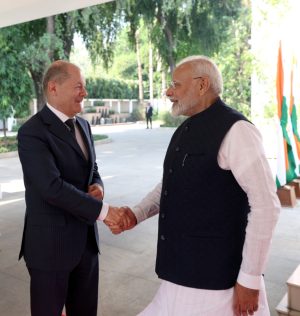When Canadian President Justin Trudeau first accused New Delhi of involvement in the death of Hardeep Singh Nijjar in 2023, the response from the Five Eyes – an intelligence-sharing alliance comprising Australia, Canada, New Zealand, the United Kingdom, and the United States – was fairly muted. A year later, the picture is somewhat different.
In a serious diplomatic escalation, on October 13, Canada expelled six Indian diplomats, including Indian High Commissioner Sanjay Verma, due to their alleged involvement in “activities which threaten public safety in Canada… including murder” — a covert reference to Nijjar. Dismissing these allegations as “preposterous imputations… centered around vote bank politics,” India, in a tit-for-tat move, promptly expelled six Canadian diplomats, including the acting high commissioner.
This time around, although short of full-throated support for member Canada, the response from the Five Eyes is much more visible.
In going public first, Trudeau ensured that this dispute does not remain confined to the bilateral level. The Canadian government has repeatedly made references to ongoing cooperation among the Five Eyes members on the ongoing investigation into the murder of Nijjar, a Canadian Sikh separatist, in a suburb of Surrey, Canada on June 18, 2023, even indicating coordinated action on possible sanctions against India.
The U.S. and U.K. have come out strongly in support of Canada, with Washington openly accusing India of not cooperating with Canada’s investigations and London calling on New Delhi to cooperate with Canada’s legal process as it was “the right next step.” The response from the other members was relatively neutral, with Australia calling for respect for sovereignty and rule of law “of all countries” while New Zealand said the “alleged criminal conduct… if proven, would be concerning” without naming India.
This raises the important question: how will Canada’s allegation affect New Delhi’s relations with other Western countries, specifically the Five Eyes?
First, despite the Five Eyes grouping being one of the oldest and most integrated partnerships born from spying arrangements dating back to World War II, it is still an ad-hoc arrangement, rather than an alliance between nations. This means that unlike a NATO-type agreement where members are legally bound to take collective action, there is no legal imperative for Five Eyes members to act collectively. Neither are they concerned with aligning their policy positions, as is seen often within the EU member states. Moreover, for a group whose existence was publicly disclosed only in 1999, and gained international attention after the 2013 Snowden leaks, some members remain reticent about publicly sharing information regarding security briefings.
Second, India’s ties with the other members have only grown since Canada publicly came out with its allegations against New Delhi. Australia-India trade has grown, and free trade agreement (FTA) negotiations that are in full swing are expected to conclude in the next two months. Similar FTA negotiations with the U.K. have continued, with the deal now reportedly within “finger-touching distance,” and the next round expected to resume next month. Despite the ups and downs in India-U.S. relations under President Joe Biden, he said Washington’s partnership with New Delhi is “stronger, closer, and more dynamic than any time in history” when he met with Indian Prime Minister Narendra Modi on the sidelines of the Quad summit last month. In recent years, bipartisan support for deepening ties with New Delhi has grown in New Zealand, paralleling the increased frequency of high-level diplomatic visits. Given such deep linkages in multifaceted directions, derailment of ties would require realignment of geopolitical alignments, which at this stage seems unlikely.
Finally, Canada’s allegations have failed to derail India’s ties with other European countries. Germany is clearly eager to advance relations with India, evinced from the recently released “Focus on India” strategic document, which describes New Delhi as “a democratic partner of Germany for stability and security.” During German Chancellor Olaf Scholz’s recent visit to New Delhi, both sides signed several agreements, including a mutual legal assistance treaty for criminal matters, a pact for the exchange and protection of classified information, and a joint declaration focused on employment and labor. Additionally, Modi announced the launch of a green hydrogen roadmap, designed to enhance cooperation in renewable energy between the two countries.
During his recent visit to India, the first by a Spanish premier in 17 years, Prime Minister Pedro Sanchez signed several MoUs covering rail transport, culture and tourism. He and Modi inaugurated India’s first private military aircraft plant in Vadodara. The plant will manufacture the Airbus C295 aircraft, the first of which is expected in 2026. Under an agreement signed in 2021, Airbus Defense and Space and India’s Tata Group will manufacture 56 cargo and troop-carrying C295 aircraft, of which 16 will be assembled in Seville and 40 in India. These examples are emblematic of how New Delhi’s ties with Europe are only growing and unlikely to get derailed by external developments.
For New Delhi, Khalistani activism overseas remains a challenge, not just in Canada but in the U.S., Australia, and across Europe. Both Germany and the U.S. have prosecuted Indian intelligence agents in the past, which does raise thorny questions about India’s position on transnational killings. In light of growing concerns about New Delhi’s human rights abuses, it is a challenge for the Modi government to be fully transparent on its position on transnational killings.
However, as it currently stands, the onus is on Ottawa to prove its hefty allegations against India. With all eyes watching, it remains to be seen if Canada’s hardline approach proves counterproductive or forces other countries to rethink ties with India. As it currently stands, India has been able to steer the international current in a manner that does not undermine New Delhi’s interests, as it did when Western countries raised concerns about India’s “neutral” position on Russia.

































